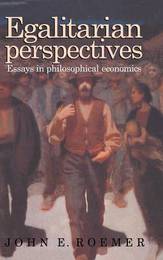
|
Egalitarian Perspectives: Essays in Philosophical Economics
Hardback
Main Details
| Title |
Egalitarian Perspectives: Essays in Philosophical Economics
|
| Authors and Contributors |
By (author) John E. Roemer
|
| Physical Properties |
| Format:Hardback | | Pages:370 | | Dimensions(mm): Height 236,Width 159 |
|
| Category/Genre | Economic theory and philosophy |
|---|
| ISBN/Barcode |
9780521450669
|
| Classifications | Dewey:330.01 |
|---|
| Audience | | Professional & Vocational | |
|---|
|
Publishing Details |
| Publisher |
Cambridge University Press
|
| Imprint |
Cambridge University Press
|
| Publication Date |
25 February 1994 |
| Publication Country |
United Kingdom
|
Description
This book presents fifteen essays, written over the past dozen years, that explore contemporary philosophical debates on egalitarianism, using the tools of modern economic theory, general equilibrium theory, game theory, and the theory of mechanism design. Egalitarian Perspectives is divided into four parts: the first part presents Roemer's influential reconceptualization of the Marxian theory of exploitation as a theory of distributive justice; the second part offers a critique of Ronald Dworkin's equality-of-resources theory; the third part introduces a novel application of the theory of mechanism design to the study of political philosophy; and the fourth part presents the author's views on market socialism and public ownership, and demonstrates that Professor Roemer is at the forefront of refining new theories and conceptions of market socialism.
Reviews"The essays John Roemer brings together in this collection are of the very highest caliber. This is work of great originality, intelligence, and scholarly competence that effortlessly straddles the boundaries between economics and philosophy." Daniel Hausman, University of Wisconsin "What is nice about Egalitarian Perspectives is that it allows us, in the case of the five pieces dealing with exploitation, to follow the evolution of Roemer's thought as it encounters difficulties...I remain...very challenged by Roemer's argument...he convinces me that exploitation is a much more complicated and general phenomenon than has traditionally been recognized." Contemporary Sociology
|